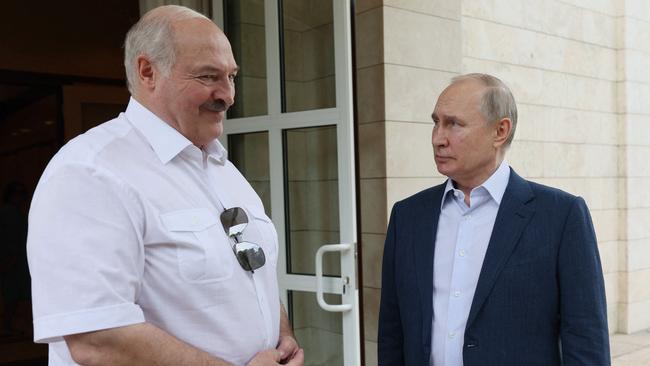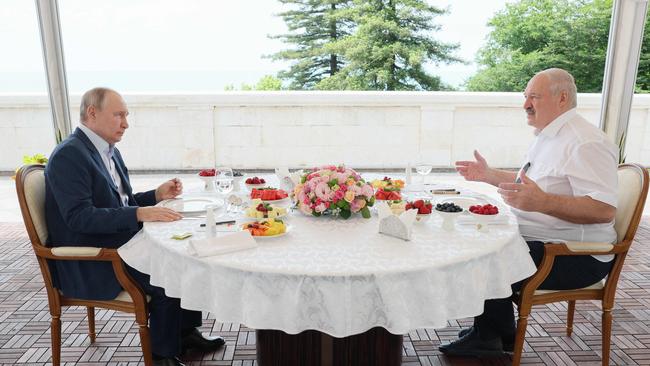Kremlin raises spectre of nuclear war in Europe
Belarus has begun taking delivery of Russian tactical nuclear weapons, as an influential Kremlin adviser warns of nuclear strikes on Europe.

Belarus has begun taking delivery of Russian tactical nuclear weapons, even as an influential Kremlin adviser warns of possible nuclear strikes on Europe to “break” the West’s support for Ukraine.
Sergey Karaganov, a chairman at the Council of Foreign and Defence policy, said that Russia should escalate its nuclear rhetoric to try to force western countries to “back down”, including by advising Russians living abroad to evacuate from areas near potential targets. If this failed, he said that Moscow should carry out nuclear attacks on European cities.
“This is a morally terrible choice – we use the weapons of God, dooming ourselves to severe spiritual losses. But if this is not done, not only Russia may perish, but, most likely, the entire human civilisation will end,” he wrote in an article titled A Difficult But Necessary Decision, published by Global Affairs, a Kremlin-linked website.
Karaganov, a hardliner thought to have influenced President Putin’s thinking on the West and Ukraine, said there was little chance that the United States would retaliate for nuclear strikes on Europe. “Only if there is a madman in the White House … will America decide on a strike to defend Europeans, incurring a response and sacrificing, say, Boston for, say, Poznan.”
His remarks followed Putin’s warning this week that continued supplies of western weapons to Ukraine could trigger a third world war.
In Minsk, Alexander Lukashenko, the Belarusian dictator, said in an interview with Russian state television that his country had received “missiles and bombs from Russia that are three times more powerful than those dropped on Hiroshima and Nagasaki”.
Belarus, a former Soviet state, is Moscow’s biggest ally. The warheads could be housed at Lida airbase, 25 miles from the Lithuanian border, according to the Federation of American Scientists think tank.

This is the first time since the collapse of the Soviet Union that Russia has deployed nuclear weapons outside the country. Lukashenko said he would not hesitate to use them if required but would do so only in consultation with the Kremlin. “God forbid I have to make a decision to use those weapons today, but there would be no hesitation if we face an aggression,” he said.
The Kremlin has said the warheads will remain under its control.
It is unclear exactly what type of nuclear weapons Belarus has received, but in March Putin spoke of giving it Iskander ballistic missile systems that can deliver conventional and nuclear warheads. They have a range of about 300 miles.
State media in Moscow has regularly called for nuclear strikes against Britain and other western allies since the start of the war in Ukraine.
Kremlin policy allows it to use nuclear weapons to respond to “aggression against the Russian Federation with conventional weapons when the very existence of the state is threatened”. Putin has portrayed the fighting in Ukraine as a sacred battle against western “satanism” that will determine Russia’s destiny for years to come.
Jens Stoltenberg, the head of Nato, said yesterday that there were no signs that Moscow is preparing to launch nuclear weapons.
The Ukrainian military claims to have retaken seven villages in the past week but Russia has responded to the counteroffensive with a fresh wave of missile strikes on Ukraine’s cities, killing civilians. On Tuesday Putin made a rare admission of Russian losses to the counteroffensive, saying that 54 tanks had been destroyed this month. He denied Ukraine had made any gains, saying that it had lost hundreds more tanks and vehicles in the fighting.
Ramzan Kadyrov, the Kremlin-backed leader of Chechnya, claimed yesterday that his right-hand man, Adam Delimkhanov, a Russian MP who also heads the Chechen division of the Russian national guard, was “alive and well”, despite reports that he had been killed in Ukraine. Delimkhanov led Chechen forces in Mariupol, the port city razed by Russia. Kadyrov’s claim has not been verified.
Fears of a more imminent nuclear disaster have been stoked by last week’s collapse of a dam in southern Ukraine that provides water to cool the reactors at the Zaporizhzhia nuclear power plant, the largest in Europe. It has been occupied by Russian troops for more than a year.
Rafael Grossi, head of the International Atomic Energy Agency, was due to visit the plant yesterday but his trip was delayed over security concerns, Ukraine said. “There are hostilities going on and the military is assessing the situation,” German Galushchenko, Ukraine’s energy minister, said. The atomic watchdog has said that the dam disaster complicated “an already precarious nuclear safety and security situation” at the plant.
Last night a spokesman for the White House national security council condemned Karaganov’s warning of nuclear strikes on European cities as “reckless and irresponsible”.
Reacting to Karaganov’s taunt that the US would not come to Europe’s aid, the spokesman added: “As President Biden said yesterday, we remain committed to the collective defence of the Nato alliance.”
The Times



To join the conversation, please log in. Don't have an account? Register
Join the conversation, you are commenting as Logout